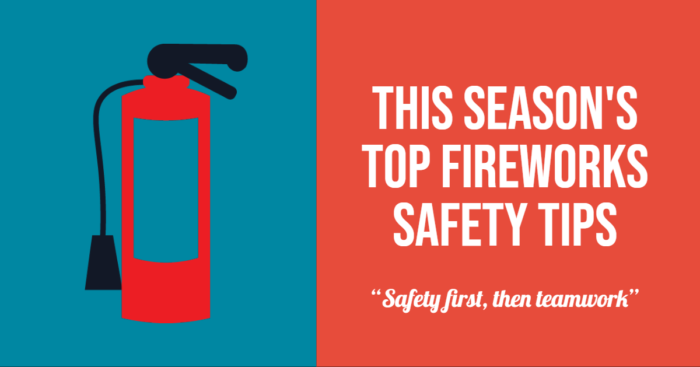Safety First with Fireworks
People all over the world love using fireworks. However, fireworks can be dangerous when safety precautions are not utilized. Most fireworks injuries occur when fireworks are discharged improperly. We want everyone to stay safe this 4th of July. Here are our best fireworks safety tips!
Always have adult supervision
In fact, we recommend that young children don’t use fireworks at all. Some fireworks look like toys but they are not. Please do not let your children light alone. They may miss safety instructions on labels or use fireworks incorrectly, resulting in burns.
Always wear eye protection
Personal protective equipment is a must when using an explosive product such as fireworks. At minimum, users should wear safety glasses to protect from sparks and falling debris. If lighting larger or louder product, we definitely recommend ear plugs.
Make sure the area is safe for the use of fireworks
Even for small items, make sure the scene is safe. Dry grass can catch fire with something as simple as a bottle rocket. Also, do not light in close proximity to houses or other buildings. Stay clear of overhanging trees. For larger Class C fireworks, the National Fireworks Association (NFA) recommends that spectators be one hundred feet away per inch of shell shot. For example, if you are shooting 2-inch shells, make sure your friends are at least 200 feet away.
Designate a shooter
Alcohol and fireworks do not mix. Being impaired while lighting fireworks can be as dangerous as being impaired behind the wheel. Choose a designated lighter to safely enjoy your fireworks product.
Follow label instructions
In addition to telling you which side of the firework to face toward spectators, many fireworks labels provide additional instructions on the label. Look carefully. And please, use common sense. Never point or throw fireworks at another person. Never throw fireworks at all, except for snappers thrown toward the ground of course.
Have water handy & soak product after use
Bonus points if you have a fire extinguisher! Some items will catch fire after they are lit. You can dump water on or use the extinguisher. Items like sparklers should be placed into a bucket of water immediately after use. Other than that, do not touch product that has been lit for at least 24 hours. After 24 hours, all product should be soaked before disposal to ensure there’s no additional firing.
Never shoot fireworks in metal or glass containers
These materials can explode and cause a lot of harm. Exception can be made for bottle rockets. But, for example, do not light artillery shells in these. Instead, utilize the cardboard or fiberglass tubes provided in your favorite box of artillery shells.
Stabilize fireworks
Fireworks can tip when ejecting their shots. It’s best to stabilize even something as small as a parachute tube. But specifically for cakes and artillery shells, stabilizing is a must. We recommend wood, cinder blocks, bricks, etc. You can also remove the bottom paper and use glue to adhere them down to your launch platform. When using tubes for shells, be sure to secure them in concrete or something equally as stable.
Light one firework at a time
An exception can be made if you are trained and lighting of a fireworks display. Other than that, crossing fuses can cause accidental misfires.
Never attempt to relight a firework
This can be extremely dangerous for a few reasons:
- If you tried to light it once, odds are your fuse is short and too close to the powder
- Secondly, it’s hard to tell if all of the shots were fired; they could launch at any time, that is why we advise to wait 24 hours
- Lastly, it might actually be lit, just delayed, so do not approach it
Never have any portion of your body over the firework
Squat down and light the fuse from the side.
Never experiment with homemade fireworks
M-80s, salutes, sparkler bombs, etc. are extremely dangerous and ILLEGAL. They are not classified fireworks. Injuries resulting in homemade illegal explosives are not fireworks injuries.
Follow these precautions to get the maximum fun from your fireworks products. Injuries are almost always preventable. Have a safe and fun 4th of July!


